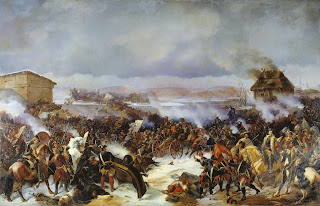In 1700 the Great Northern War began when an alliance consisting of Denmark-Norway, Saxony-Poland-Lithuania (though Poland-Lithuania was officially neutral at first) and Russia launched an attack on Sweden (The Danish invaded first). The Polish, Danish and Russians had all suffered at the hands of the Swedish Empire, during its age of expansion. King Charles XII of Sweden, aided by the English and Dutch, rapidly forced the Danish into peace with the Peace of Travendal. During, the period when the Swedish and Danish were fighting. Augustus II the Strong of Saxony had invaded Livonia, but when Charles XII moved his army there ( from Denmark) Augustus swiftly withdrew his men. Charles XII then move to engage the Russians in Narva and Ingria. At Narva, Charles would prove that he was a skilled military commander when he attacked the Russian besiegers there. The Swedish had 10,000 men and were almost outnumbered by four to one by the Russians, however Charles XII of Sweden attacked under the cover of a blizzard and effectively split the Russian army in two. The battle was a great success for the Swedish, who only lost 667 men, while the Russians lost nearly 10,000 men. Charles then decided to campaign in Poland and by 1704 Stanislas Leszcznyski became the puppet King of Poland. During 1706, the Russians and Saxons were forced out of Poland and Augustus II recognised Stanislas as King of Poland. After so much success for the Swedish it is hard to see how the war ended with them no longer being a great power, the war's tide was about to change.
The Battle of Narva
While Charles XII had been campaigning in Poland, the Russians had made incursions into the parts of the Baltic controlled by Sweden and established St Petersburg. Charles XII wanted to permanently put an end to Russia being a threat to Sweden and so in 1707 his invasion of Russia began. However, Peter had reformed the Russian army, partially based on the Swedish army which it was about to face. After, winning the Battle of Holowczyn, Charles marched on Moscow, rather then trying to take St Petersburg. However, the Swedish were forced to march to Ukraine as harsh conditions set in. In 1709, the Swedish would face the battle that changed history, Poltava. The Ukrainian Cossacks aided Charles, as they sought independence. However, Charles had been wounded and was in a coma, so he could not lead the Swedish forces. The Russians decisively won the battle and they forced Charles into exile into the Ottoman Empire.
Charles XII of Sweden
Charles XII was unable to return to Sweden and so Sweden's enemies once again proved to be dangerous. The Danish were rebelled, but Russia continued to invade Sweden's Baltic lands and Finland. In Poland, Stanislas fled and Augustus returned. Charles was initially welcomed by the Ottomans and even provoked them into war with Russia. But, his scheming eventually made him into an unwelcome guest and he soon rode across Europe to Straslund, and then later moved on back to Sweden. In 1716 Charles invaded Norway, as part of his plan to attack Denmark. However, he failed to take the Akershus fortress, despite occupying Christiania and he was forced to retreat. He then invaded again and besieged Fredriksten, but once again he was forced to retreat. He lead one final invasion and once again besieged Fredriksten. On the 11th December 1718 Charles was struck in the head by a projectile and killed. It is unknown if he was killed by enemy fire or by one of his own men. The Great Northern War would end in 1721, with Sweden no longer being a great power and Peter the Great proclaiming Russia an empire. The Russian Empire was a great power following the end of the war.
Image Credit:
http://commons.wikimedia.org/wiki/File:Portrait_of_Charles_XII_of_Sweden.jpg
http://en.wikipedia.org/wiki/File:Victory_at_Narva.jpg
Sources:
Greatly,
http://www.historylearningsite.co.uk/great_northern_war.htm


No comments:
Post a Comment